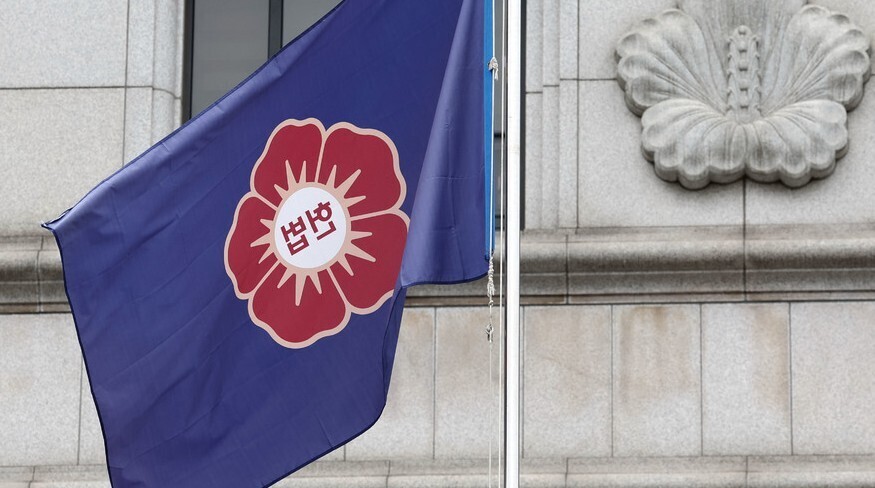hankyoreh
Links to other country sites 다른 나라 사이트 링크
Bill to curb investigative powers doesn’t violate prosecutors’ rights, Constitutional Court rules

Korea’s Constitutional Court has ruled that amendments to the Prosecutors’ Office Act and the Criminal Procedure Act that curtailed prosecutors’ investigative powers did not infringe on the authority of prosecutors. The ruling is grounded in the fact that prosecutors’ investigative powers are not constitutionally granted but are to be adjusted and allocated by legislation.
In a 5-to-4 decision on Thursday, the Constitutional Court dismissed a petition filed by Minister of Justice Han Dong-hoon and six prosecutors disputing the jurisdiction of the National Assembly to curb prosecutors’ investigative powers. The court found that there was “no possibility of a violation of authority” for the petitioners, and dismissed the petition raised by Han outright, stating, “The Minister of Justice, who does not directly exercise the power to investigate and prosecute, is not entitled to bring this case.”
The revised Prosecutors’ Office Act and Criminal Procedure Act, which went into effect in September 2022, reduce the types of crimes for which prosecutors can directly initiate investigations from the six major types of crime (corruption, economic crimes, crimes by public officials, election crimes, defense industry crimes and mass casualty crimes) to two significant types of crime prescribed by presidential decree: corruption and economic crimes.
The revisions also include the separation of the powers of investigation and indictment, and a reduction in the scope of complementary investigations by prosecutors. The revision was introduced with the intention of reducing prosecutors’ bloated powers, but Han and several prosecutors pursued constitutional litigation claiming that “prosecutors’ investigative and prosecutorial powers granted by the Constitution were infringed.”
The issue came down to whether prosecutors’ powers to investigate and indict are constitutionally granted. Han et al. had argued that prosecutors’ investigative powers guaranteed by the Constitution could not be infringed by legislation, citing Article 12, paragraph 3 of the Constitution, which states, “Warrants issued by a judge through due procedures upon the request of a prosecutor shall be presented in case of arrest, detention, seizure or search.”
However, the Constitutional Court ruled that it was “difficult to see that prosecutors’ right to investigate under the Constitution can be derived from the warrant application provision,” adding that “the right to investigate is a power that can only be formed through legislation by the National Assembly. Prosecutors’ right to investigate and indict cannot be infringed by legislative power.”
On the other hand, the Constitutional Court ruled that the rights to deliberate and vote on the revisions were violated in the process of passing the amendment in a 5-to-4 opinion.
In April 2022, lawmaker Min Hyung-bae “fraudulently defected” from the Democratic Party and joined the Legislation and Judicial Committee’s agenda coordination panel, creating a 4-to-2 composition that effectively enabled deliberation and debate to be omitted. However, the five judges did not find the bill invalid.
By Shin Min-jung, staff reporter
Please direct questions or comments to [english@hani.co.kr]

Editorial・opinion
![[Guest essay] Preventing Korean Peninsula from becoming front line of new cold war [Guest essay] Preventing Korean Peninsula from becoming front line of new cold war](https://flexible.img.hani.co.kr/flexible/normal/500/300/imgdb/original/2024/0507/7217150679227807.jpg) [Guest essay] Preventing Korean Peninsula from becoming front line of new cold war
[Guest essay] Preventing Korean Peninsula from becoming front line of new cold war![[Column] The state is back — but is it in business? [Column] The state is back — but is it in business?](https://flexible.img.hani.co.kr/flexible/normal/500/300/imgdb/original/2024/0506/8217149564092725.jpg) [Column] The state is back — but is it in business?
[Column] The state is back — but is it in business?- [Column] Life on our Trisolaris
- [Editorial] Penalties for airing allegations against Korea’s first lady endanger free press
- [Editorial] Yoon must halt procurement of SM-3 interceptor missiles
- [Guest essay] Maybe Korea’s rapid population decline is an opportunity, not a crisis
- [Column] Can Yoon steer diplomacy with Russia, China back on track?
- [Column] Season 2 of special prosecutor probe may be coming to Korea soon
- [Column] Park Geun-hye déjà vu in Yoon Suk-yeol
- [Editorial] New weight of N. Korea’s nuclear threats makes dialogue all the more urgent
Most viewed articles
- 1[Column] Why Korea’s hard right is fated to lose
- 2[Guest essay] Preventing Korean Peninsula from becoming front line of new cold war
- 3Yoon’s broken-compass diplomacy is steering Korea into serving US, Japanese interests
- 4S. Korean first lady likely to face questioning by prosecutors over Dior handbag scandal
- 5Amid US-China clash, Korea must remember its failures in the 19th century, advises scholar
- 6After 2 years in office, Yoon’s promises of fairness, common sense ring hollow
- 7Lee Jung-jae of “Squid Game” named on A100 list of most influential Asian Pacific leaders
- 8[Column] The state is back — but is it in business?
- 9[Column] Life on our Trisolaris
- 10Hybe-Ador dispute shines light on pervasive issues behind K-pop’s tidy facade